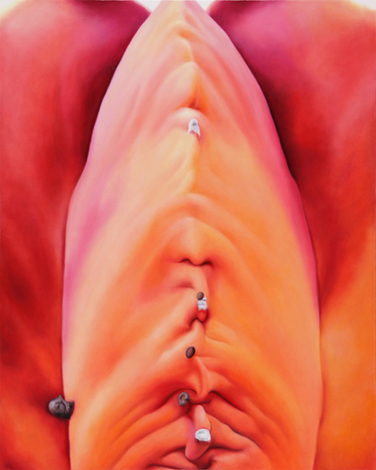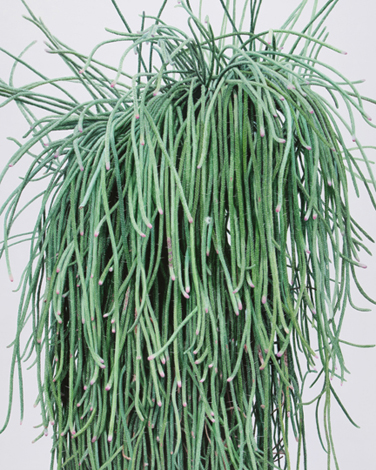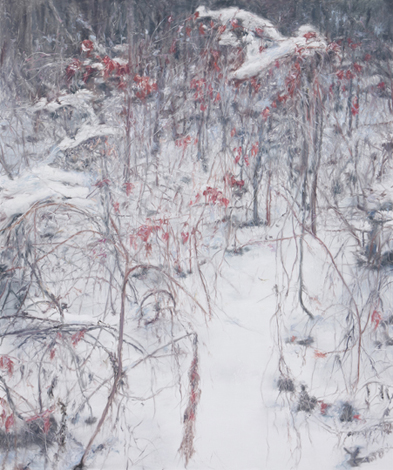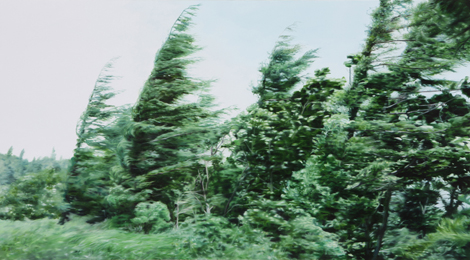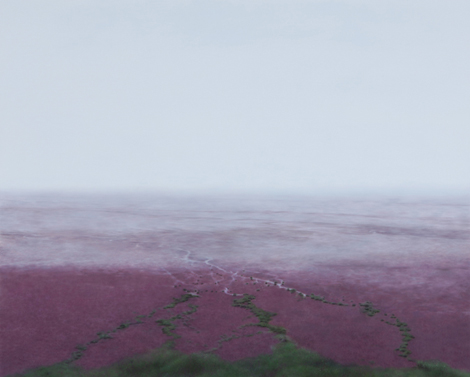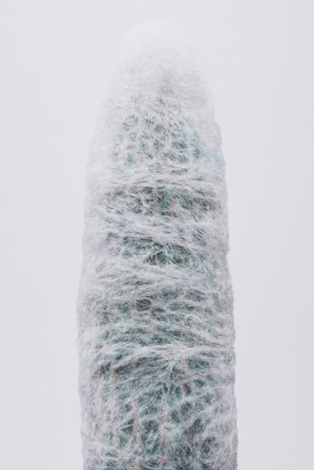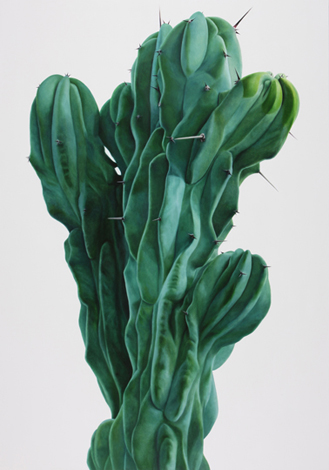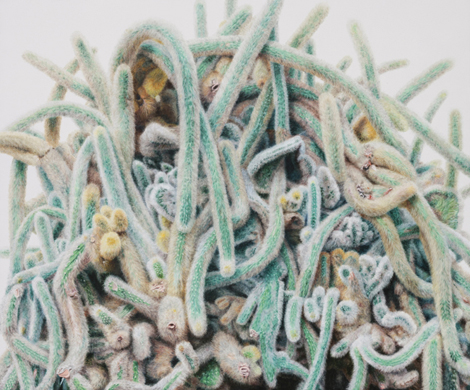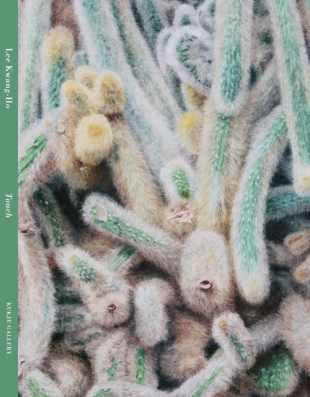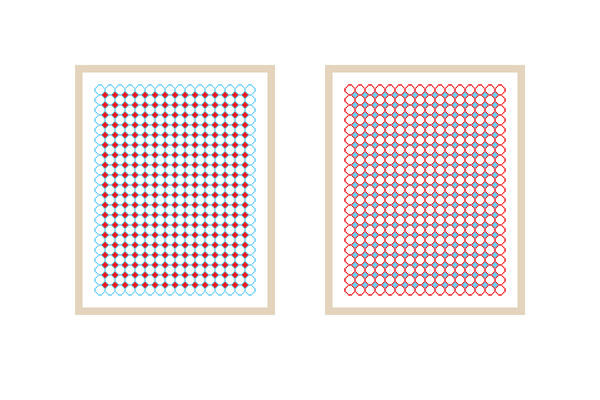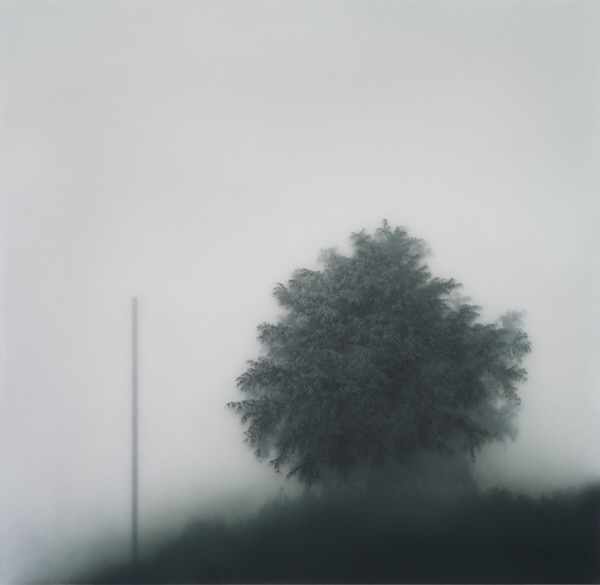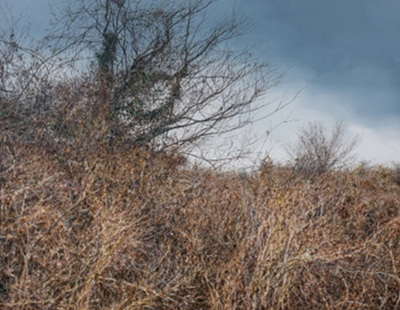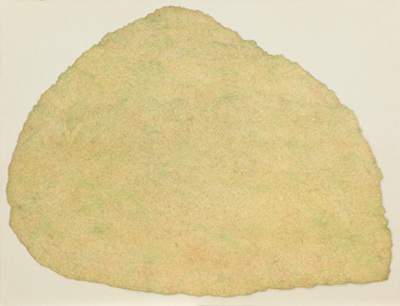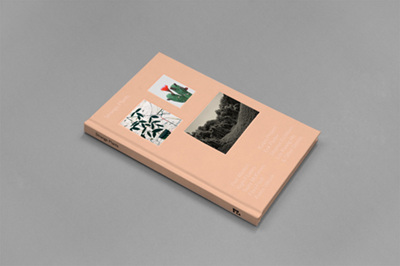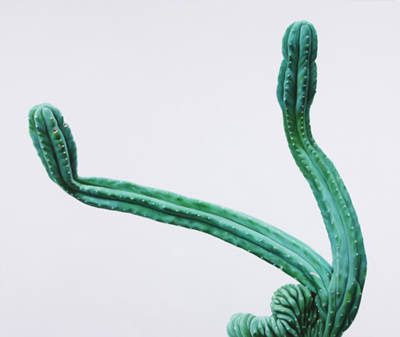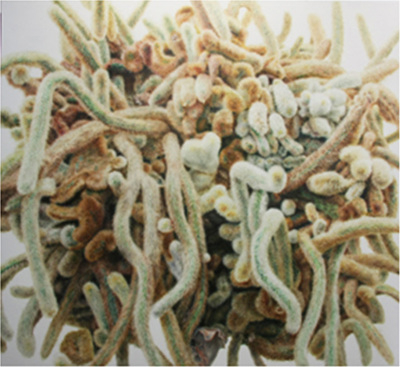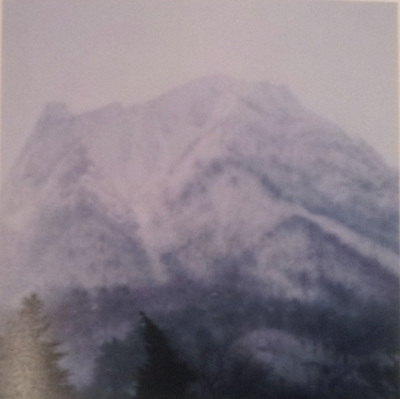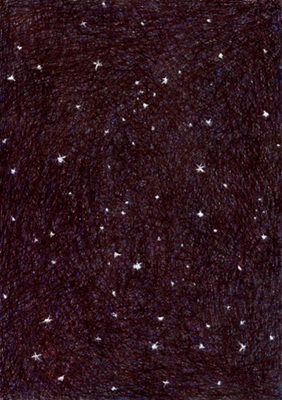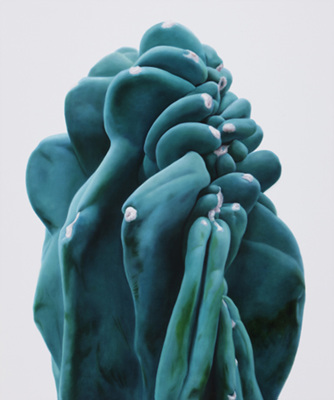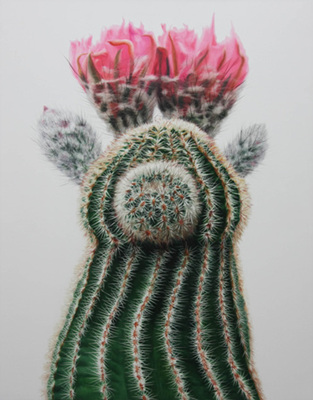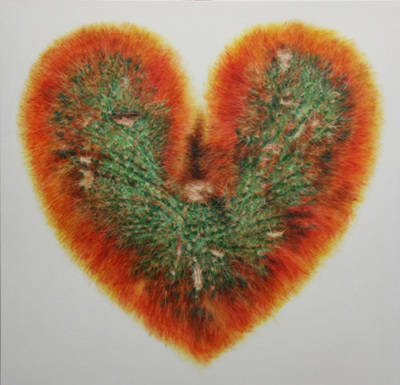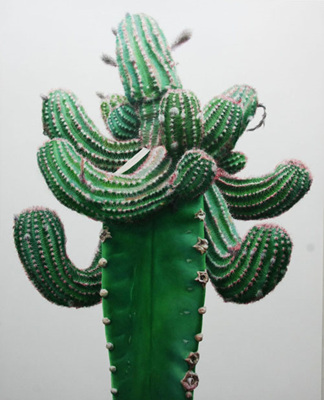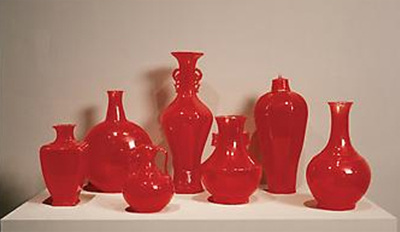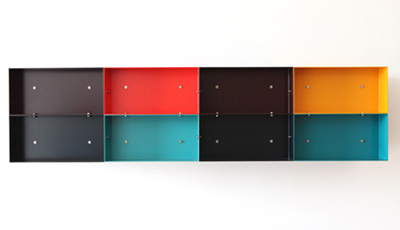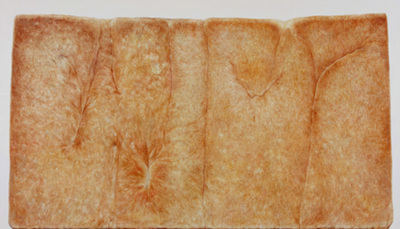 Touch | KUKJE GALLERY
Touch | KUKJE GALLERY
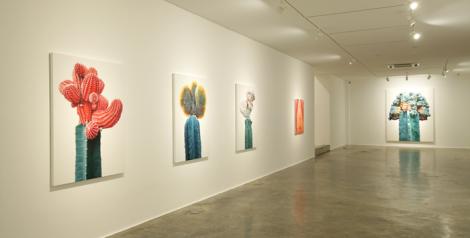
Apr 15, 2010 - May 16, 2010
K1
Seoul
INTRODUCTION
전시 소개
국제갤러리는 본관에서 4월 15일부터 이광호의 개인전 를 개최한다. 본 전시는 한국의 대표적인 사실주의 화가라고 할 수 있는 이광호 작가가 국제갤러리에서 개최하는 첫 개인전으로 회화적 기법이 보여줄 수 있는 모든 가능성을 동원하여 대상을 충실히 서술함으로써 극도의 사실성과 추상성을 동시에 표현하고 있다.
이번 전시에서 선보이는 이광호의 <선인장>과 <풍경화>시리즈는 과거 작가가 진행해왔던 연작의 연장선상에 있다. 과거 < Inter-View > 연작에서 작가 이광호는 100명의 모델을 인터뷰하면서 그들에 대한 기억을 기록한 프로젝트를 진행했다. 여기에서 작가는 재현의 대상이 되는 인물을 포착하고 서술하는 과정을 회화 뿐 아니라 동영상, 오브제 등을 함께 다루는 방식으로 대상에 대한 탐구를 입체적으로 표현했었다. 즉 모델을 재현하는 것에 머무르지 않고 다양한 방식을 통해 그것이 어떻게 우리의 시선 속에서 자신의 모습을 드러내는지에 대해 기술하는 것이다.
< Inter-View >연작에서 작가가 대상이 되는 인물과 대화하면서 그들에게서 느껴지는 심상까지 표현하려 했다면, 이번 전시에서 소개되는 작품들에서는 대상을 정하고 그것을 사진으로 촬영한 뒤, 관찰과 모사를 병행해서 작품을 완성해 가면서 작가 자신의 내면의 욕망을 표출하고자 한다. 이 과정에서 때로는 나이프로 긁어내기도 하고, 붓으로 표면을 문지르기도 하고, 두드리기도 하면서 그것이 일종의 추상적 면 혹은 색의 덩어리가 될 때까지 극대화 시켜나간다. 작은 선인장들은 거대하게 확대 되면서 ‘선정적’ 이거나 ‘동물적’으로 보이기까지 한다. 그것은 때론 인물처럼 보이기도 하고 거대한 기념비처럼 보이기도 하며 때로는 선인장 특유의 남근적인 아우라를 자아낸다. 이처럼 강열하고 드라마틱하게 표현된 대상들은 화가 내면의 욕망을 드러내는 동시에 작품을 바라보는 관객의 욕망을 환기시킨다.
<선인장> 시리즈를 지나 전시장 이층으로 올라가면 풍경화 작품들을 만날 수 있다. 풍경화에서 다루는 대상은 자연의 이곳 저곳에서 발견되는 빈 공간들이다. 여기에는 숲과 주변의 수풀들, 그 사이로 보이는 하늘과 바람의 움직임, 빛의 머무름 등이 있을 뿐이다. 특별히 아름답지도, 감동적이지도 않은 장소를 선택하여 묘사한 풍경화 작업들을 가까이 다가가 보면 대상의 묘사는 사라지고 무수한 기계적 붓질과 나이프의 흔적, 물감의 층만이 보인다. 이는 <선인장> 연작에서 보았던 표면들과 크게 다르지 않은 추상적인 표면일 뿐이다.
이처럼 <선인장>에서 <풍경화>로 이어지며 그의 작품들이 보여주고자 하는 것은 대상의 사진적 재현이 아니라, 회화의 가장 근본적인 문제인 ‘그리기’라는 행위에 대한 치열하고도 끈질긴 탐구에 더 가깝다고 할 수 있다.
이번 전시는 이광호가 최근 2년 동안 작업한 <선인장> 시리즈, <풍경화> 시리즈를 중심으로 한 약 25점이 선보일 예정이다. 회화의 맛을 유감없이 보여주는 이번 전시는 4월 15일부터 5월 16일까지 약 한 달간 지속된다.
작가 소개
이광호의 초기 작품은 자신의 소소한 체험과 일상의 편린을 그림에 등장시켜 작가의 내면 풍경과 개인사를 솔직하게 반영하는 작업이었다. 그는 자신의 눈으로 본 것에 의미를 부여한다. 그래서 그것을 사진으로 포착하고, 그림으로 그린다. 작가의 말을 빌자면 일상의 평범한 풍경 그 이면에는 숨겨져 있는 심리의 미묘한 지층이 있어 그것을 건드리고, 그래서 심리적 동요를 불러일으키게 하고 싶어한다.
이전의 서사적 회화 작업에 비해, < Inter-View >, <선인장> 시리즈는 서술을 위해 많은 것을 화면에 배치하던 방식에서 분산되었던 시선을 하나의 대상으로 압축해 놓고 있다. 특히 선인장들은 대상의 깊이를 알 수 없는 흰색의 배경 안에 고립됨으로써 더욱 추상적으로 보여진다.
화면을 가득 채운 극사실로 확대 묘사된 대상은 더 이상 선인장도, 풍경도 아닌 캔버스와 물감이 어떻게 만나 관계를 이루는 지에 대한 추상성의 표현이라 할 수 있다.
이처럼 초기의 다소 팝아트적인 유화들로부터 출발하여 원근법을 사용한 르네상스 풍의 서사적 회화를 거쳐 초현실주의적 다중화면을 이용한 작품들, 그리고 이번에 선보이는 극사실주의 작품에 이르기까지 이광호의 회화가 보여준 다양한 편력들을 살펴보면 그가 다루는 회화적 스펙트럼이 얼마나 폭넓은 것인지 깨달을 수 있다.
이광호(1967~)는 서울대학교 회화과와 동 대학원을 졸업하였다. 지난 15년간 다수의 개인전과 단체전을 통해서 국내외에 작품을 선보인 바 있으며, 특히 2006년 창동 레지던시 작가로 선정되면서부터 시작한 시리즈를 진행하면서, 한국의 대표적 사실주의 화가로 자리잡았다.
이광호의 작품은 현재 국립현대미술관, 서울시립미술관, 경기도미술관을 비롯한 유수의 기관에 소장되어 있다.
Exhibition Introduction
Kukje Gallery is pleased to present Touch, Lee Kwang-Ho’s first solo exhibition at this venue. As one of Korea’s most prominent realist artists, Lee displays his technical and pictorial mastery with the ability to meticulously combine elements of the real and the abstract.
Lee’s early works were inspired by Pop Art, influenced by the Renaissance perspective, and Surrealism, and have now developed into his own unique and personal interpretation of modern realism. A thorough investigation of his works provides the viewer an opportunity to fully appreciate the depth and versatility of Lee’s artistry and vision.
Lee Kwang-Ho’s most recent works on view can be seen as an extension of his previous projects such as Inter-View, in which Lee attempted to reproduce the memories of one hundred models that the artist personally knew by conducting extensive interviews with each of them.
In creating the new Cactus and Landscape series, Lee has experimented with various techniques such as scratching, rubbing of the paintbrush, and tapping on the canvas whilst enlarging the subject to its extreme to make the cactus seem like a type of abstraction. As a result, the small cacti can appear animal-like, rouse a unique phallic aura, and be reminiscent of a monument or even a model from the Inter-View series.
In contrast, the Landscape series deals with empty spaces found in nature. Lee presents us with familiar open spaces consisting of woods and forests, skies and movement of the wind. The landscapes are not particularly beautiful or nostalgic but upon closer observation, the depicted subjects actually disappear, revealing only a layer of paint comprised of countless, precise brushstrokes, and markings of a meticulous knife work. In the end, the abstract surface of the Landscape series is actually quite similar to that of the Cactus paintings. The artist has attempted to create not only a realistic transfer of the subject onto the canvas but to investigate the fundamental question of painting - the act of painting itself.
This solo exhibition has two years in its making and will run at Kukje Gallery from April 15 to May 16.
Artist Introduction
Lee Kwang-Ho's early work sought to give glimpses into the trivialities of everyday experiences in order to truthfully reflect one's "inner landscape." As a painter, Lee emphasizes the meanings attached to objects in his vision; thus, he photographs an object, and then sketches it. According to Lee, there are psychological truths underlying the images of everyday life, and it is his objective to reveal and dramatize these truths.
Lee Kwang-Ho (1967~) received Bachelor's and Master's Degrees in Fine Arts from Seoul National University, and has, for the past 15 years, exhibited his works in both solo and group exhibitions. In 2006, Lee was selected as a Changdong Residency Artist, whereupon he successfully embarked on his Inter-View series, placing himself among Korea's well-known realists.
Lee Kwang-Ho's works are currently in the collections of the nation’s many prestigious art institutions, including the National Museum of Contemporary Art, the Seoul Museum of Art, and the Gyeonggi Museum of Modern Art.
국제갤러리는 본관에서 4월 15일부터 이광호의 개인전 를 개최한다. 본 전시는 한국의 대표적인 사실주의 화가라고 할 수 있는 이광호 작가가 국제갤러리에서 개최하는 첫 개인전으로 회화적 기법이 보여줄 수 있는 모든 가능성을 동원하여 대상을 충실히 서술함으로써 극도의 사실성과 추상성을 동시에 표현하고 있다.
이번 전시에서 선보이는 이광호의 <선인장>과 <풍경화>시리즈는 과거 작가가 진행해왔던 연작의 연장선상에 있다. 과거 < Inter-View > 연작에서 작가 이광호는 100명의 모델을 인터뷰하면서 그들에 대한 기억을 기록한 프로젝트를 진행했다. 여기에서 작가는 재현의 대상이 되는 인물을 포착하고 서술하는 과정을 회화 뿐 아니라 동영상, 오브제 등을 함께 다루는 방식으로 대상에 대한 탐구를 입체적으로 표현했었다. 즉 모델을 재현하는 것에 머무르지 않고 다양한 방식을 통해 그것이 어떻게 우리의 시선 속에서 자신의 모습을 드러내는지에 대해 기술하는 것이다.
< Inter-View >연작에서 작가가 대상이 되는 인물과 대화하면서 그들에게서 느껴지는 심상까지 표현하려 했다면, 이번 전시에서 소개되는 작품들에서는 대상을 정하고 그것을 사진으로 촬영한 뒤, 관찰과 모사를 병행해서 작품을 완성해 가면서 작가 자신의 내면의 욕망을 표출하고자 한다. 이 과정에서 때로는 나이프로 긁어내기도 하고, 붓으로 표면을 문지르기도 하고, 두드리기도 하면서 그것이 일종의 추상적 면 혹은 색의 덩어리가 될 때까지 극대화 시켜나간다. 작은 선인장들은 거대하게 확대 되면서 ‘선정적’ 이거나 ‘동물적’으로 보이기까지 한다. 그것은 때론 인물처럼 보이기도 하고 거대한 기념비처럼 보이기도 하며 때로는 선인장 특유의 남근적인 아우라를 자아낸다. 이처럼 강열하고 드라마틱하게 표현된 대상들은 화가 내면의 욕망을 드러내는 동시에 작품을 바라보는 관객의 욕망을 환기시킨다.
<선인장> 시리즈를 지나 전시장 이층으로 올라가면 풍경화 작품들을 만날 수 있다. 풍경화에서 다루는 대상은 자연의 이곳 저곳에서 발견되는 빈 공간들이다. 여기에는 숲과 주변의 수풀들, 그 사이로 보이는 하늘과 바람의 움직임, 빛의 머무름 등이 있을 뿐이다. 특별히 아름답지도, 감동적이지도 않은 장소를 선택하여 묘사한 풍경화 작업들을 가까이 다가가 보면 대상의 묘사는 사라지고 무수한 기계적 붓질과 나이프의 흔적, 물감의 층만이 보인다. 이는 <선인장> 연작에서 보았던 표면들과 크게 다르지 않은 추상적인 표면일 뿐이다.
이처럼 <선인장>에서 <풍경화>로 이어지며 그의 작품들이 보여주고자 하는 것은 대상의 사진적 재현이 아니라, 회화의 가장 근본적인 문제인 ‘그리기’라는 행위에 대한 치열하고도 끈질긴 탐구에 더 가깝다고 할 수 있다.
이번 전시는 이광호가 최근 2년 동안 작업한 <선인장> 시리즈, <풍경화> 시리즈를 중심으로 한 약 25점이 선보일 예정이다. 회화의 맛을 유감없이 보여주는 이번 전시는 4월 15일부터 5월 16일까지 약 한 달간 지속된다.
작가 소개
이광호의 초기 작품은 자신의 소소한 체험과 일상의 편린을 그림에 등장시켜 작가의 내면 풍경과 개인사를 솔직하게 반영하는 작업이었다. 그는 자신의 눈으로 본 것에 의미를 부여한다. 그래서 그것을 사진으로 포착하고, 그림으로 그린다. 작가의 말을 빌자면 일상의 평범한 풍경 그 이면에는 숨겨져 있는 심리의 미묘한 지층이 있어 그것을 건드리고, 그래서 심리적 동요를 불러일으키게 하고 싶어한다.
이전의 서사적 회화 작업에 비해, < Inter-View >, <선인장> 시리즈는 서술을 위해 많은 것을 화면에 배치하던 방식에서 분산되었던 시선을 하나의 대상으로 압축해 놓고 있다. 특히 선인장들은 대상의 깊이를 알 수 없는 흰색의 배경 안에 고립됨으로써 더욱 추상적으로 보여진다.
화면을 가득 채운 극사실로 확대 묘사된 대상은 더 이상 선인장도, 풍경도 아닌 캔버스와 물감이 어떻게 만나 관계를 이루는 지에 대한 추상성의 표현이라 할 수 있다.
이처럼 초기의 다소 팝아트적인 유화들로부터 출발하여 원근법을 사용한 르네상스 풍의 서사적 회화를 거쳐 초현실주의적 다중화면을 이용한 작품들, 그리고 이번에 선보이는 극사실주의 작품에 이르기까지 이광호의 회화가 보여준 다양한 편력들을 살펴보면 그가 다루는 회화적 스펙트럼이 얼마나 폭넓은 것인지 깨달을 수 있다.
이광호(1967~)는 서울대학교 회화과와 동 대학원을 졸업하였다. 지난 15년간 다수의 개인전과 단체전을 통해서 국내외에 작품을 선보인 바 있으며, 특히 2006년 창동 레지던시 작가로 선정되면서부터 시작한 시리즈를 진행하면서, 한국의 대표적 사실주의 화가로 자리잡았다.
이광호의 작품은 현재 국립현대미술관, 서울시립미술관, 경기도미술관을 비롯한 유수의 기관에 소장되어 있다.
Exhibition Introduction
Kukje Gallery is pleased to present Touch, Lee Kwang-Ho’s first solo exhibition at this venue. As one of Korea’s most prominent realist artists, Lee displays his technical and pictorial mastery with the ability to meticulously combine elements of the real and the abstract.
Lee’s early works were inspired by Pop Art, influenced by the Renaissance perspective, and Surrealism, and have now developed into his own unique and personal interpretation of modern realism. A thorough investigation of his works provides the viewer an opportunity to fully appreciate the depth and versatility of Lee’s artistry and vision.
Lee Kwang-Ho’s most recent works on view can be seen as an extension of his previous projects such as Inter-View, in which Lee attempted to reproduce the memories of one hundred models that the artist personally knew by conducting extensive interviews with each of them.
In creating the new Cactus and Landscape series, Lee has experimented with various techniques such as scratching, rubbing of the paintbrush, and tapping on the canvas whilst enlarging the subject to its extreme to make the cactus seem like a type of abstraction. As a result, the small cacti can appear animal-like, rouse a unique phallic aura, and be reminiscent of a monument or even a model from the Inter-View series.
In contrast, the Landscape series deals with empty spaces found in nature. Lee presents us with familiar open spaces consisting of woods and forests, skies and movement of the wind. The landscapes are not particularly beautiful or nostalgic but upon closer observation, the depicted subjects actually disappear, revealing only a layer of paint comprised of countless, precise brushstrokes, and markings of a meticulous knife work. In the end, the abstract surface of the Landscape series is actually quite similar to that of the Cactus paintings. The artist has attempted to create not only a realistic transfer of the subject onto the canvas but to investigate the fundamental question of painting - the act of painting itself.
This solo exhibition has two years in its making and will run at Kukje Gallery from April 15 to May 16.
Artist Introduction
Lee Kwang-Ho's early work sought to give glimpses into the trivialities of everyday experiences in order to truthfully reflect one's "inner landscape." As a painter, Lee emphasizes the meanings attached to objects in his vision; thus, he photographs an object, and then sketches it. According to Lee, there are psychological truths underlying the images of everyday life, and it is his objective to reveal and dramatize these truths.
Lee Kwang-Ho (1967~) received Bachelor's and Master's Degrees in Fine Arts from Seoul National University, and has, for the past 15 years, exhibited his works in both solo and group exhibitions. In 2006, Lee was selected as a Changdong Residency Artist, whereupon he successfully embarked on his Inter-View series, placing himself among Korea's well-known realists.
Lee Kwang-Ho's works are currently in the collections of the nation’s many prestigious art institutions, including the National Museum of Contemporary Art, the Seoul Museum of Art, and the Gyeonggi Museum of Modern Art.
WORKS
|
Cactus No.46 |
Cactus No.37 |
|
|
Sobaeksan |
Daekwanryung |
|
|
Kanghwado |
Cactus No.40 |
|
|
Cactus No.30 |
Cactus No.47 |
|
INSTALLATIONS
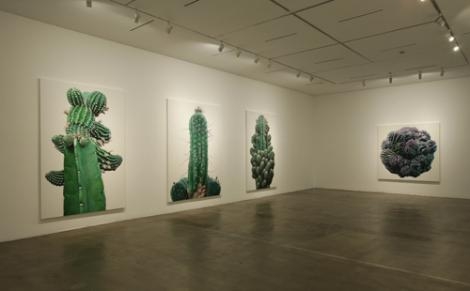
|
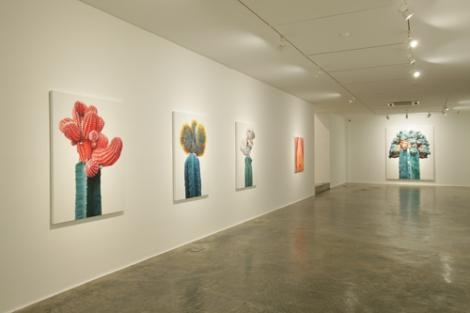
|
|
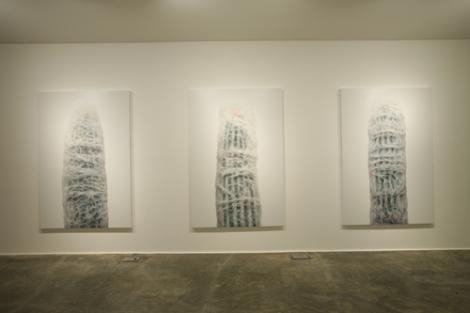
|
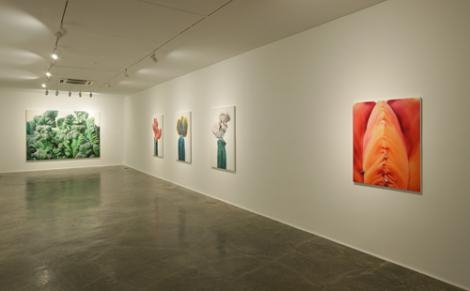
|
|
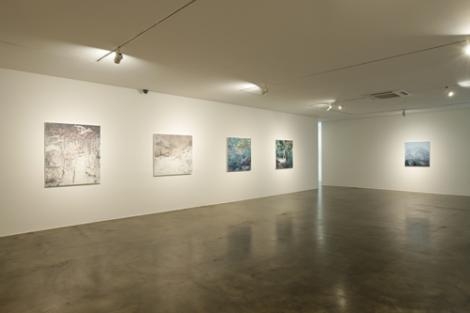
|
PUBLICATIONS
| Touch |
